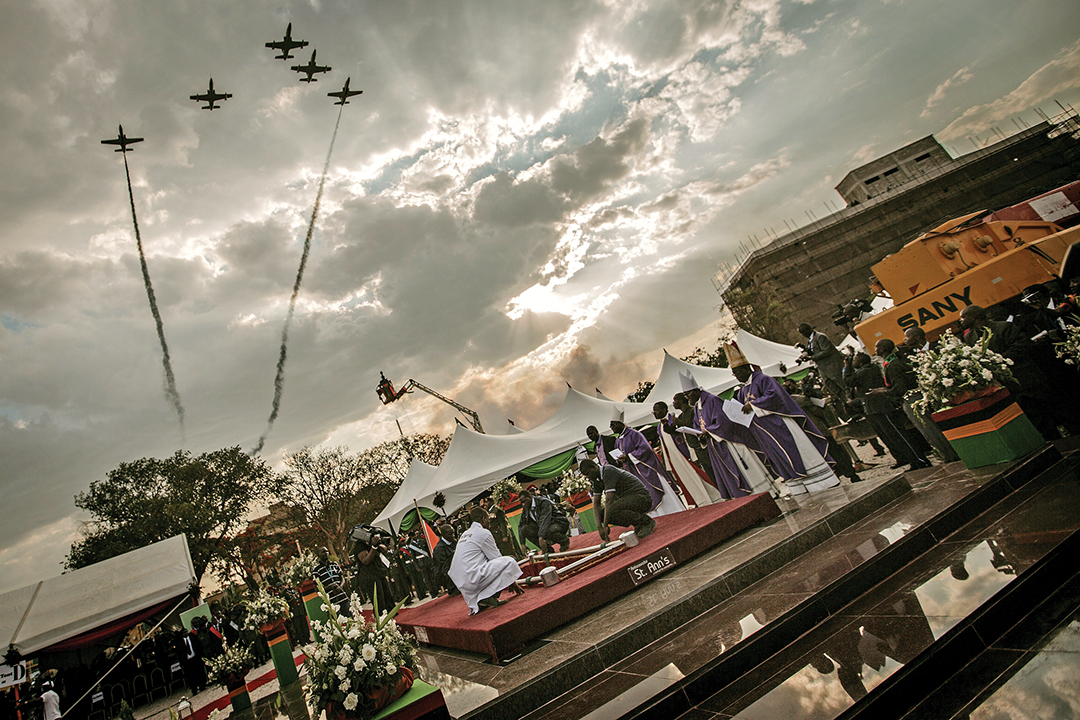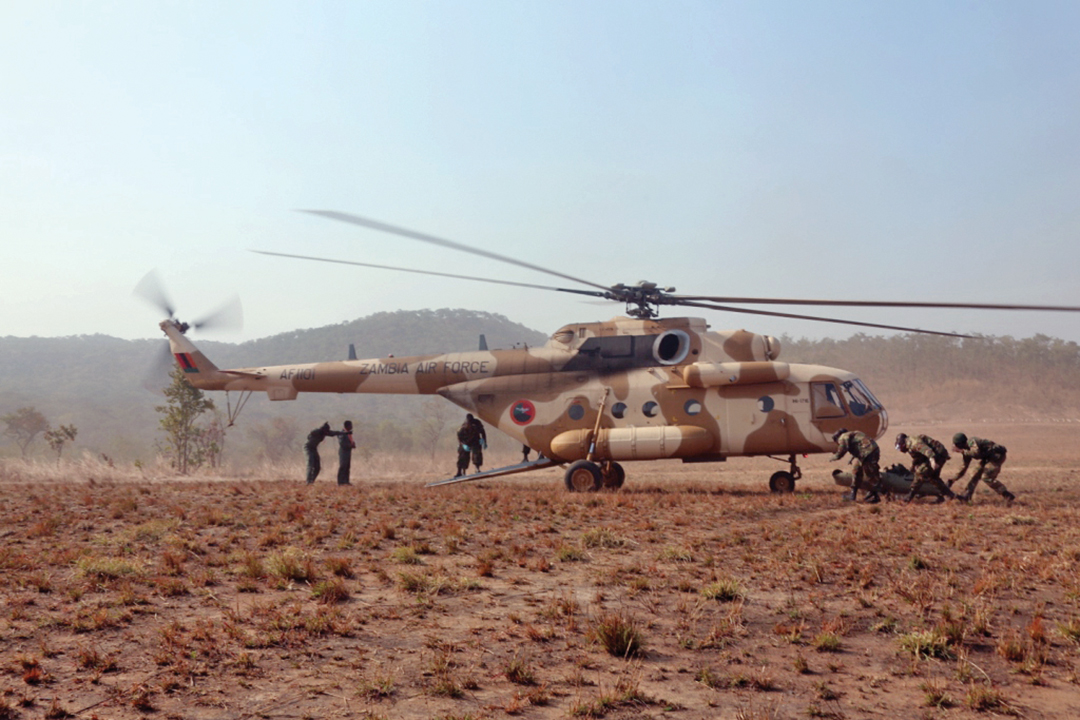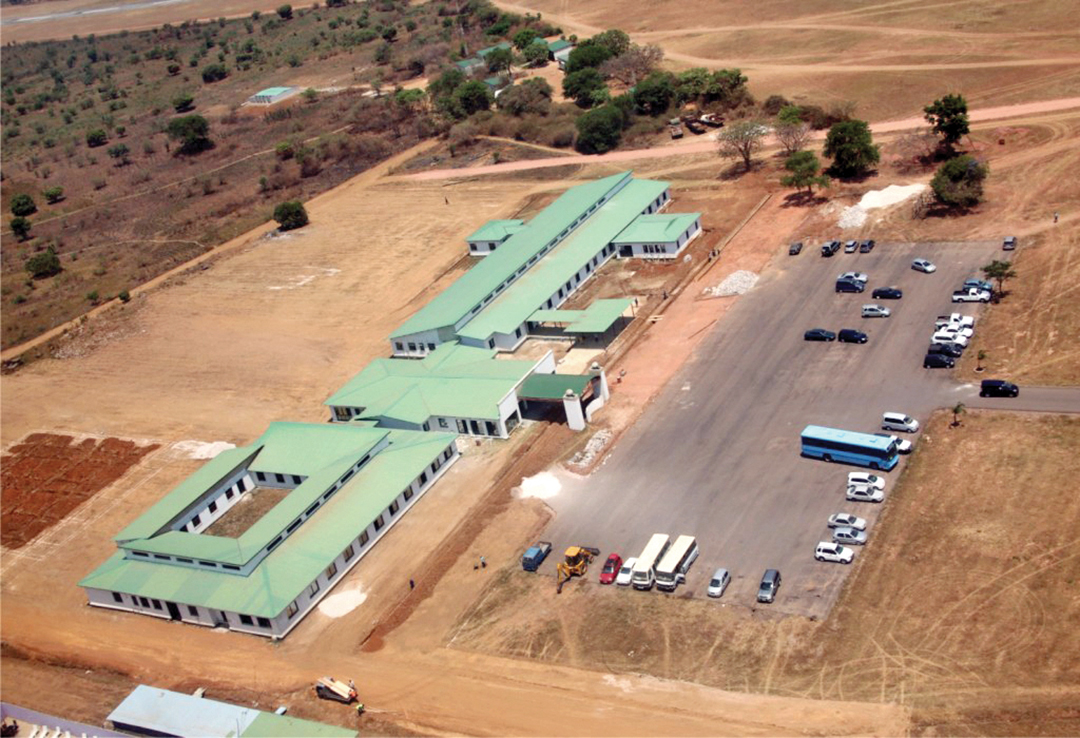The country sees air power as a crucial force as it charts a path to middle-income status
ADF STAFF
The year 2016 may be a turning point for the Zambia Air Force.
The Air Force will finish taking delivery of six SF-260TW training aircraft, made by the Italian company Alenia-Aermacchi.
The Air Force has ordered six Chinese-made L-15 Falcon fighter jets, at a cost of about $100 million. It also is taking delivery of an Italian-made C-27J transport plane and an undisclosed number of Russian Mi-17 helicopters.
At the end of 2015, Zambian President Edgar Lungu vowed to help modernize the Air Force, and the country has launched a public-private partnership to help build support infrastructure.
Lungu perhaps best summed up the intent of the Zambia Air Force (ZAF) in a speech in December 2015. Lungu said protecting Zambia’s airspace creates an “enabling environment” for local and foreign investment in the country, according to the Daily Mail. He said modernizing the Air Force meant having a lean, well-equipped, trained organization that would help elevate Zambia to the status of a middle-income nation.
“The acquisition of new equipment is a long-term investment and a great cost to my government and the people of Zambia,” he said. He urged the Air Force to observe “the highest standards of maintenance and safety.”

Defense publications reported in early 2016 that the current air fleet includes 12 MiG 21 aircraft, 15 K-8 Karakorum jets, 10 Saab MFI Safari MT-15 trainer planes, 10 MB-326 light jets, seven Z-9 light attack helicopters and some older Chinese-made fighter jets. The new SF-260TW trainers will help relieve the Air Force’s shortage of flying hours and training.
As of January 2016, six Zambia Air Force pilots already had completed training to fly the new L-5 fighter jets, and a team of technicians had been trained to maintain them.
Lt. Gen. Eric Chimese, commander of the Zambia Air Force, said his country’s decades of economic stagnation had left most of the Air Force’s equipment obsolete. At the time, the cost of replacement aircraft was too expensive. Now that has changed.
“The modernization of our air fleet is an ongoing process that should be able to provide us with an increasing capability to respond to the air power needs of our country within the context of our internal security requirements and the regional and global dynamics,” Chimese told Africa Defense Forum in a written statement.
The ZAF recognizes that it is only as good as its personnel, and the modernization of the fleet requires more maintenance crew members and pilots. “Our personnel are trained both locally and abroad, and we therefore benchmark with the most advanced air forces in the world,” Chimese said. “We have a very competitive and professional selection process and training that meets required international standards for all our personnel, including pilots.”
HELPING CIVILIANS
The Zambia Air Force is being called upon to do more for the country than defend its borders. With no national airline, Zambia’s Air Force serves as the transport of choice for government officials who need to move around the country quickly. The Air Force is taking on projects that serve more than just its own needs, such as a state-of-the-art hospital at air headquarters in Lusaka that will serve the public and Air Force personnel. The mess at air headquarters also will be open to the public. In the northern city of Mbala, the Air Force has opened its air base to civil aviation.

Zambia is 17th among African countries in terms of area. African countries with remote inaccessible areas often have to deal with the illegal exploitation of resources and the influence of local militias or extremist groups. Without government authority over its entire area, a modern country cannot thrive. That’s where Zambia’s Air Force is critical.
“The Zambia Air Force has ensured that it retains the reach to the remotest parts of the country and the capacity to transport government officials anywhere, any time,” Chimese said. “This has helped to ensure that no population feels isolated from its government and the rest of the country. There are no ‘ungoverned spaces’ in Zambia.”
He said that with the ongoing modernization, the Air Force will have better access to the entire country and will be able to improve its surveillance.
Giving civilians access to the new hospital is consistent with the Air Force’s standard policies. All ZAF clinics on all ZAF bases and units throughout the country are open to civilians and, in fact, attend to more civilian patients than military personnel. The Air Force also makes its facilities available to young people for sports, including football, rugby and volleyball. The Air Force sponsors one of the country’s biggest football clubs, the Red Arrows.
Officials told the Daily Mail that modern recreational facilities have been built at Air Force Headquarters City Airport, Air Force Headquarters Chamba Valley, ZAF Livingstone, ZAF Mumbwa and ZAF Lusaka.
Chimese said his Airmen train to help civilians in natural disasters, particularly the floods that have plagued Southern Africa over the past two decades.
“Floods have particularly been endemic in our region and Zambia in particular, resulting in the interruption and destruction of crops, people’s dwellings, as well as endangering their lives,” Chimese wrote to ADF in January 2016. “The Zambia Air Force over the years has been training its personnel to grow and maintain its capacity and competencies to respond to such disasters.”

“In providing all these, reach and speed are of essence in order to save lives,” he said. “These are the competencies ZAF train for, equip for, and provide to the people of Zambia and beyond. In providing such disaster assistance, ZAF works closely with the Disaster Management and Mitigation Unit under the office of the vice president.”
The Air Force also is involved in national elections, with Chimese stressing that in a democracy such as Zambia, “the election process is of critical importance.”
“ZAF facilitates the speedy implementation of this process by providing air transport to election officials, and delivery and collection of election materials to and from remote areas of the country,” he said. “Air transport in this process plays a vital role, as any delay at any stage may be a recipe for conflict in the election process.”
The Africa Center for Strategic Studies says that for Africa’s air forces to be truly effective, they need to build airlift partnerships and pool airlift resources. To that end, the ZAF participates in almost all peacekeeping and humanitarian exercises in the Southern African Development Community region.
“In all these exercises, Zambia has been one of the largest contributors in terms of personnel and air assets,” Chimese said. “In light of modernization and increased airlift capacity, our participation in peacekeeping at the regional and global level can only increase.”
HELPING THEIR COMMUNITIES
The Air Force has other initiatives of a decidedly nonmilitary nature. It is playing an active role in the national Keep Zambia Clean and Healthy campaign, implemented in 2015. The Air Force also has its Air Power Ladies Club, a nongovernmental organization made up of female recruits and the wives of male service personnel. The club has come to the aid of the elderly, the handicapped and the underprivileged.
Chimese stresses, however, that the first role of the ZAF is defense.

The improved Air Force is already paying dividends, he said.
“In the past, there were some illegal flights into the country’s game management areas that went undetected, resulting in the loss of wild game, a resource precious to Zambia’s economy,” he said. “Today, such is no more. Our concerns do not only lie in protecting the airspace during times of conflict, should that arise. They emanate from, and go toward, supporting the political, social and economic aspirations and vision of our national leaders.”

